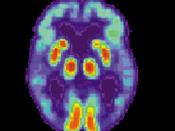Coma. Paralysis. Inoperable cancer. Alzheimer's disease. Permanent brain damage. Severely handicapped newborn. Terminal condition. Some of us face these dreaded circumstances ourselves or in the lives of our loved ones. How do we respond?
For hundreds of years assisted suicide has been an issue, but with the rise of modern technology, never before has it been a more controversial issue. The issue of euthanasia raises many questions that have still not yet been soundly answered. When is it right to die? Who gets to decide? Each person has his own moral convictions; therefore, each person has his own answer to a terminal situation.
What is the definition of euthanasia? Many definitions are given, but which is the most accurate? Much terminology is used to make euthanasia sound like an act of compassion and gentleness, something good. Some refer to euthanasia as mercy killing or death with dignity. One definition for euthanasia is, "the putting of a person to death painlessly" (Bender 24).
Does the fact that the death is painless justify the act? This ambiguity justifies Hitler's putting to death the Jews in the gas chambers. Was this act of his just euthanasia? The death of the Jews was painless and merciful in that it got them out of their misery, but Hitler's act is not being justified. That was homicide. Is euthanasia just murder also? For the purpose of this paper, the definition of euthanasia will be, "to produce death or assist an individual in achieving death because others, or even the patient himself, considers life no longer worth living. The motive is usually to relieve suffering, save money, or do away with the indignities associated with dying" (Tada 58).
Is euthanasia ethical? Two different kinds of euthanasia can be chosen: active or passive. Active euthanasia is mercy killing...



Euthanasia
This subject is truly one of the most controversial topics argued about today. One comment you made was that Euthanasia can be defined as withholding of life saving medicine. I do agree with that, but in doing that it raises questions regarding those who do not believe in receiving medical treatment due to religious beliefs. Such beliefs are considered the right of these people to practise their own religion, a basic human right, as well as a constitutional one. If that is the case, then refusing a blood transfusing, the result being death, would be considered euthanasia. How can we separate instances like these from those of the decisions made through a moral or ethical belief. We, in good conscience, cannot allow some people to carry through with euthanasia because of a certain belief or faith, but not allow others due to theirs. Having watched a best friend die slowly and painfully from cancer, at a young age, I know, that had she asked me to help her go, to end her pain, I would have not hesitated. I loved her with all my heart, we had grown up together, been each others bridesmaids, godmother to each others young children, and to watch every ounce of dignity stripped from her, the pain and humiliation showing in her eyes, it tore me apart, and it is a picture I cannot get out of my head. This is not the way people want to be remembered. I'm not a strong religious person, but I'm sure that if God were as just and compassionate as people say, he would understand that these people have gone through enough pain knowing they are leaving loved ones behind and missing out on the rest of their lives, and he would therefore not judge them as sinful or weak for wanting to leave and join him while they are still able to make the decision themselves.
30 out of 30 people found this comment useful.